At China’s biggest gaming convention, the showgirl culture isn’t going to die so easily
Showgirls are still a major appeal at gaming conventions, where firms like Tencent and NetEase deploy an army of young women to entertain the mainly male attendees

Chen Yuxin teaches kindergarten in Shanghai when school is in, but over the summer break she took on a gig that her students and teaching colleagues knew nothing about.
For four days, the 23-year-old ditched her schoolteacher look for cute make-up, a pink mini sailor skirt, and 3-inch high heels to entertain a potential audience of 350,000 – predominantly male.
Chen was one of the thousands of showgirls employed at ChinaJoy, China’s biggest gaming convention, that concluded in Shanghai earlier this month. First held in 2004, ChinaJoy built a reputation over the years for the scantily clad girls that exhibitors often used to hawk their products. It even got to the stage where the gaming show was jokingly referred to by the three Chinese characters that sound similar to its name – chai naizhao – which means “undo a bra.”
That all changed in 2015 when conference organiser Shanghai Hanwei, which declined to comment for this story, introduced strict costume guidelines for the showgirls which, among other things, banned them from revealing more than 2 centimetres (nearly 0.8 inches) of cleavage, or risk a substantial fine.
While the “sex sells” vibe of earlier exhibitions has been toned down, showgirls like Chen remain a major appeal of ChinaJoy, where the country’s biggest gaming firms like Tencent and NetEase deploy an army of young women – now more fully dressed – to greet and entertain the mainly male attendees.
The practice is a reflection of the sexism still rampant in China’s gaming industry, the world’s largest with estimated sales of US$15 billion in the first half of this year, where women still have a long way to go before they are seen as anything more than decoration.
Tencent and NetEase did not respond to requests for comment.
“ChinaJoy has become our home court,” said Chen, who keeps quiet about her kindergarten teaching life. “Most of the booths rely on young girls to attract visitors, who will then take a look at content.”
China’s gaming population reached 583 million last year, of which 45 per cent were female, according to data provider CNG. However, since most games are male-oriented, female gamers contributed just 21 per cent of the industry’s revenue in 2017, and only one in four people employed in the industry are women.
The South China Morning Post spoke with more than a dozen showgirls at this year’s ChinaJoy, whose roles ranged from hostesses and models to dancers and cosplayers.
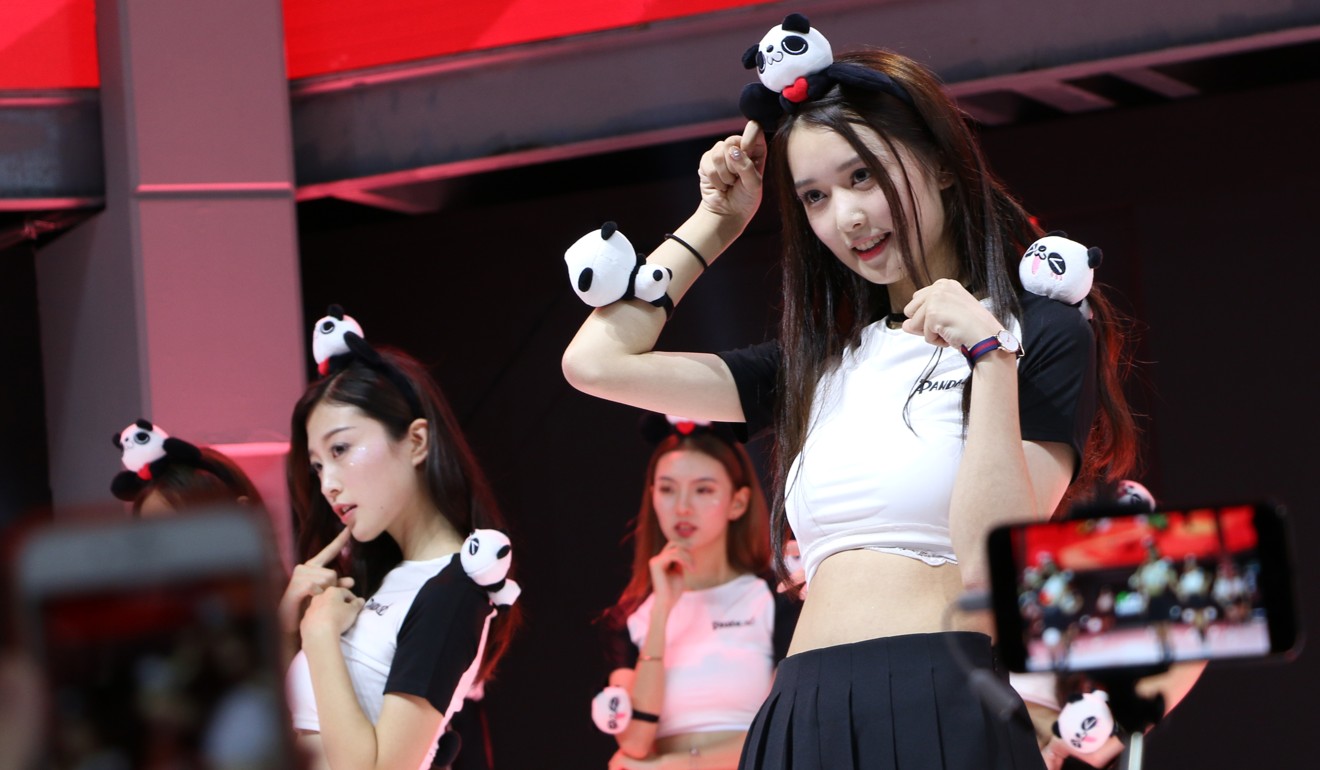
Although most said they didn’t feel like they were being treated as an object, the twenty-somethings – and some just-turned adults – had to endure several hours of standing each day and occasional sexual harassment from visitors to earn as little as 500 yuan (about US$70) per day.
Liu Xinyi, 24, was one of 30 showgirls wearing double buns and traditional Han Chinese clothing at the booth of Chinese console brand Subor.
To draw attention to its exhibit of about 60 of its newest consoles for gamers, Subor built a boxing ring-like stage where Liu and her colleagues staged catwalks and posed for pictures four times a day, with each session lasting about 15 minutes.
Offstage, Liu was surrounded by male attendees asking for selfies – at least 60 of them each day according to her estimate.
The male fans, some of whom were among her 120,000 Weibo followers, returned the favour by giving her all kinds of snacks from bubble tea to chips and cupcakes, though she complained that eating the snacks made her gain weight.
“As long as my face is not getting old, I can always come here,” said Liu, a four-time ChinaJoy showgirl who works part time as a magazine model.
Due to the new stricter costume guidelines, she said the guys now “check out faces, not boobs”.
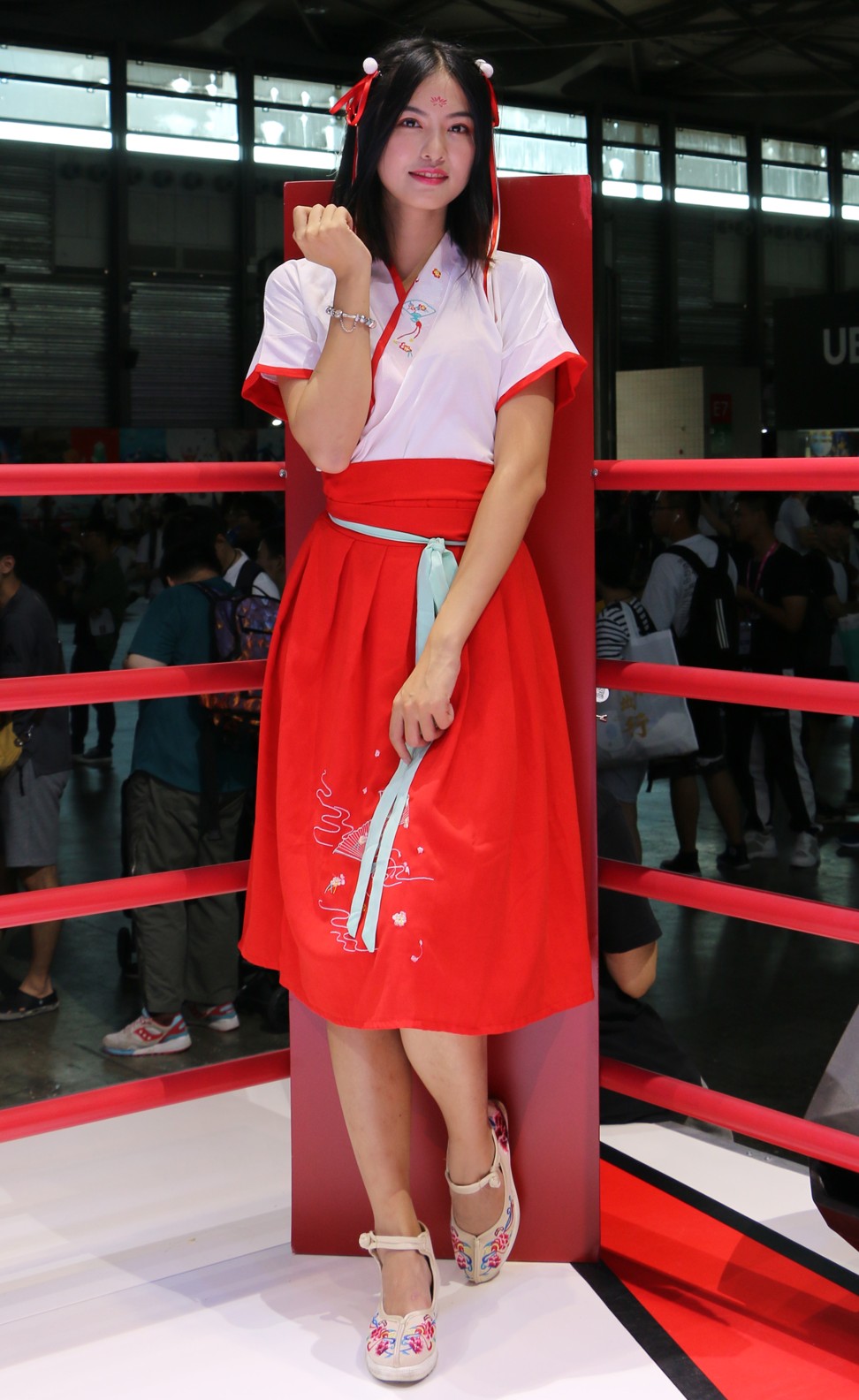
The stricter costume dress policy at ChinaJoy mirrors that of the country’s major auto shows, where provocatively dressed female models – including plunging necklines and see-through costumes – had long attracted more attention than the vehicles themselves.
Show organisers in Shanghai and Beijing have for several years banned the use of showgirls in general, but exhibitors still hire models as receptionists or saleswomen to skirt the rules.
Xue Juanjie, 24, a veteran ChinaJoy and auto exhibition showgirl, recounted how she once wore a tube top and mini skirt so short that she dared not split her legs while standing.
This year at ChinaJoy Xue said she felt more comfortable in a long white dress, a tiara and pointy ears that resembled an elf princess, as she smiled for selfies and photos. That alone gave her a sense of accomplishment.
“Smiling is really tiring if you do it from morning to night,” she said.
Exhibitors at ChinaJoy typically hire showgirls on a one-time contract through talent agencies like Shanghai Perfect Communications, which recruited about 400 showgirls this year for three clients including Chushou TV, a popular live-streaming app.
Perfect CEO Jenny Li said the qualities clients look for in showgirls vary depending on their branding. Chushou, for example, asked for showgirls who could be “lively, cheerful and cute, like girls next door,” while some gaming hardware suppliers looked for tall girls who “look stunning,” Li said.
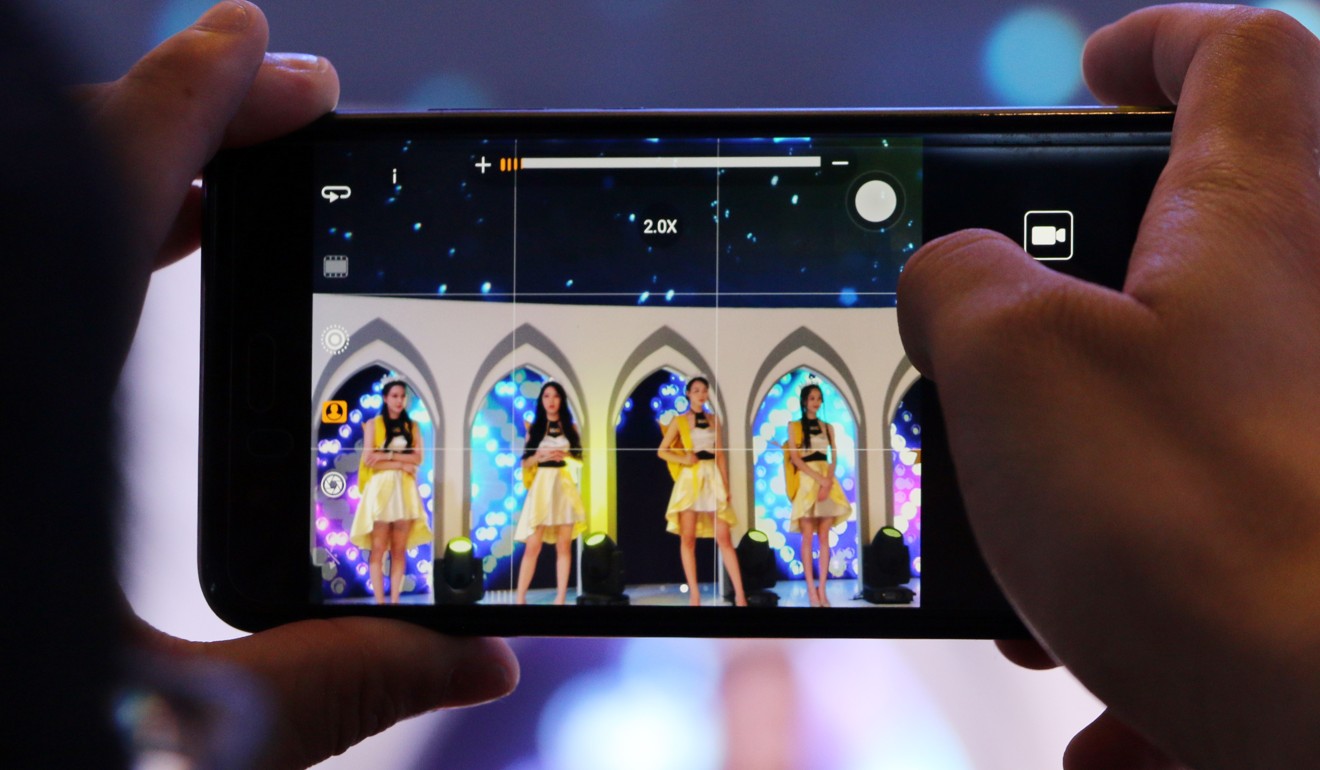
Competition is fierce, with sometimes only one in 10 applicants getting hired. Showgirls usually do interviews in groups of five, Li said, with those “not pretty enough” told to leave even before they do self introductions.
Wu Hao, a Shanghai-based manager with Subor, said the showgirls he recruited were those seen as best representing the company’s values. “Our gaming consoles make people happy, and are very approachable,” he said.
The pay rate offered to showgirls varies depending on their resumes and duties, but is usually within the range of 500 yuan to 2,000 yuan per day.
The higher wages go to hostesses who perform on stage, while the lower rate is usually for girls who appear in identical costumes on the showfloor, posing for photos all day. Dancers and cosplayers – those in costumes that represent gaming or anime characters – are paid somewhere in between and have more flexible schedules.
At major tech events in the west the use of promotional models, or “booth babes,” has become less visible – though not entirely gone – amid huge public scrutiny.
This year’s Electronic Entertainment Expo in Los Angeles, held in June, enacted new rules that require exhibitors to submit the design of their employee uniforms for pre-approval – a practice that has been in place at ChinaJoy since 2015.
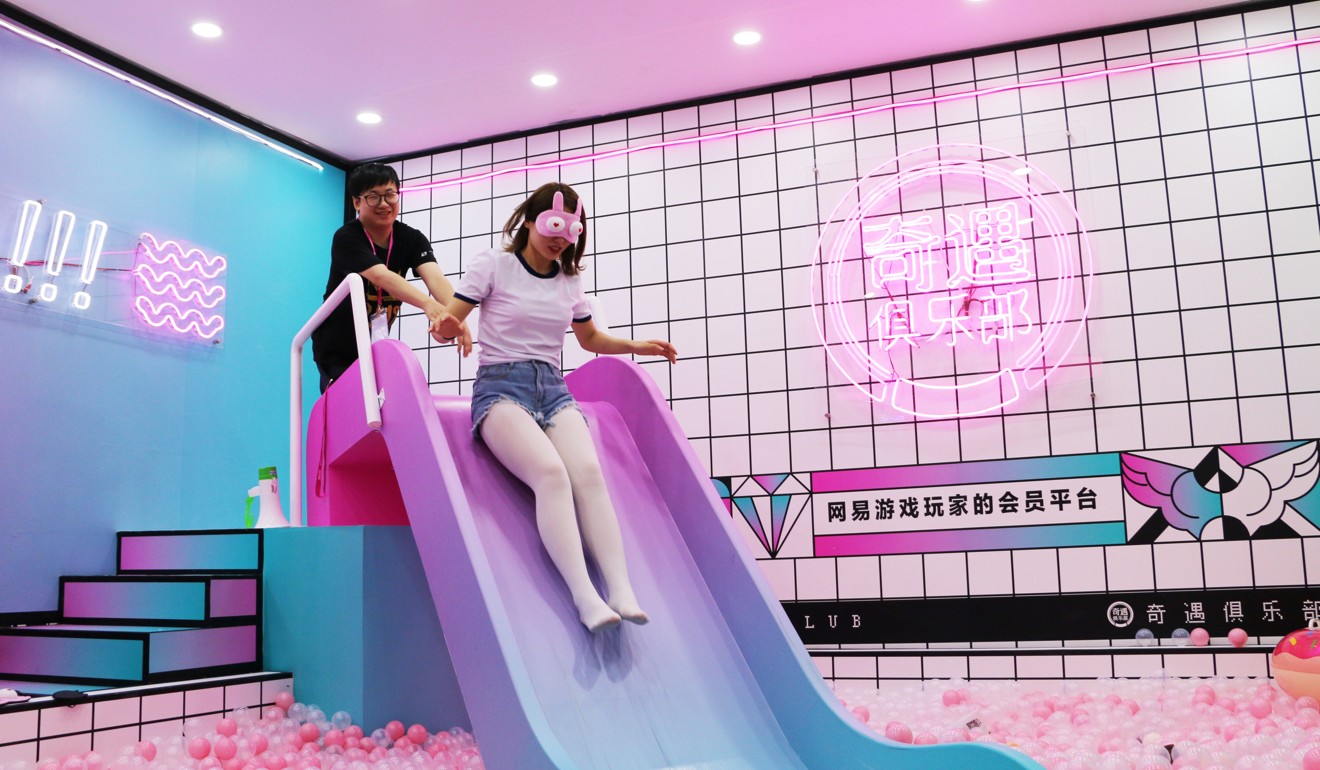
Western gaming brands at ChinaJoy this year – including Xbox, Blizzard and Ubisoft – did not employ booth models, only staffers of both genders wearing T-shirts imprinted with company slogans.
“We strongly believe that ChinaJoy visitors who come to our booth [do so] to play our latest line-up and immerse themselves in the universe of Ubisoft brands that they cherish,” Wilfried Hary, a spokesman for Ubisoft’s China operation, said in an email.
Regardless of how the showgirls dress, Chinese society does not seem to mind the male-dominated gaming culture.
Outside one of the pavilions at ChinaJoy this year was a huge poster promoting a new mobile game titled Call Me Long Live Lord, in which players role play as an ancient Chinese emperor who gets to pick concubines.
Even in one of the rare female-focused games, Love and Producer, a date simulation mobile title that went viral at the end of last year, women are portrayed lower in social ranking and are supported by one or more handsome, wealthy men.
Despite the official changes to dress rules, old habits are hard to break. At ChinaJoy, media outlets still publish online posts about the 10 hottest showgirls. Attendees, regardless of their gender, credit booth models as a major attraction of the show.
Hu Bin, a 29-year-old sales representative from Hangzhou, said he will bring a high end DSLR camera to the show next year instead of using his camera phone because the girls won’t even look at smartphones.
“If they think you are taking great photos, they will add you on WeChat to get the photos – that’s a little trick [I learned],” he said.
Zhang Yating, a female attendee who identifies herself as a casual gamer, said: “Who doesn’t want to check out young girls that look cute?”

Not surprisingly, the biggest crowds at ChinaJoy always appear when showgirls are performing on stage.
At the booth of DeNa, a Shanghai-based game developer focused on adapting Japanese animation, the mostly male attendees were invited on stage to pair up with girls in sailor costumes in a game mixing basketball with a three-legged race.
At the booth of Panda TV, a popular live-streaming app, four hostesses chatted with their fans online as passers-by took photos of them behind the windows of a studio set up at the booth.
One corner of NetEase’s stand was turned into a pool full of balloons, where attendees pushed blindfolded showgirls down a slide, and then gave them verbal directions to pick up gifts hidden among the balloons.
Some of the girls also receive unwanted advances from visitors.
Liu, the showgirl at Subor’s booth, said that last year a male attendee at ChinaJoy pestered her all day to add him as a WeChat friend and after the show he followed her to the subway station.
Liu had to ask a stranger for help to get rid of the stalker.
Showgirl Nefer Yang, 20, who asked that her ChinaJoy employer not be identified, complained about a man who came out of nowhere to hug her during a game on stage.
Oliver Xia, a hostess with Chushou, said staffers this year spotted several instances where attendees were surreptitiously taking shots underneath the girls’ skirts. They were confronted and asked to delete the photos.
Although the #MeToo movement has been gaining momentum in China as women come forward to accuse prominent men of sexual harassment, many showgirls find it difficult to speak out given their job nature.
Sun, a 20-year-old dancer at ChinaJoy, who asked to be identified only by her surname, recounted a time when a male superior groped her thighs at a public event where she was performing.
“I didn’t know what to do,” she said. “I couldn’t afford to offend him because he was the one paying me the money.”
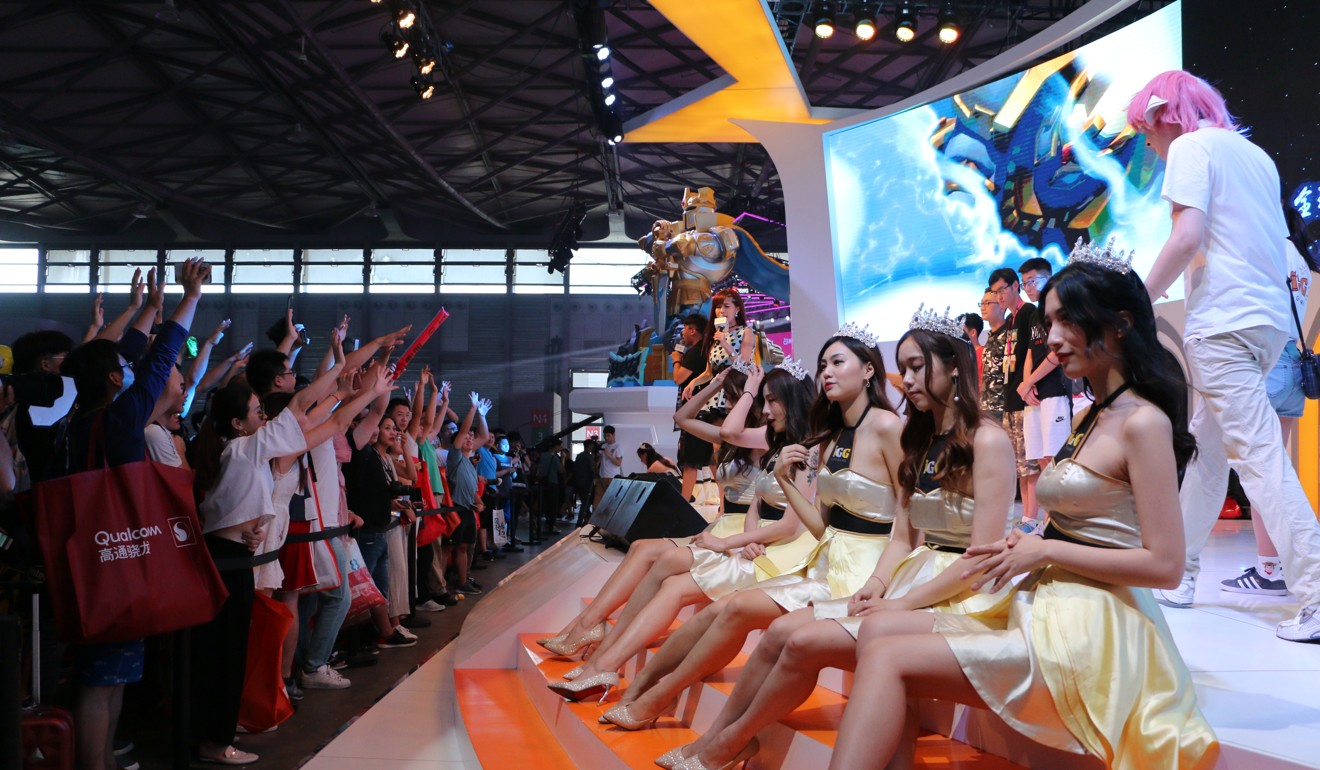
Now Sun leads a dance group comprising some of her best friends from college. They take on gigs at ChinaJoy and other shows together to allay individual safety concerns.
“We have little social experience, and we can’t tell exhibitors’ intent,” she said. “The industry is chaotic, so we must be careful.”
While the showgirl fad began well before China’s gaming industry grew into a multi-billion business, it is a reflection of a “male-dominated game discourse constructed collaboratively by a gaming industry with limited female involvement”, said Sun Jing, a postdoctoral researcher in gaming culture based in Beijing.
At the end of the day, being a showgirl is hardly a dream job. There is no career advancement and it has a social stigma around it.
“My goal is to leave the industry before I’m 25,” said Zhou Qian, 22, a hostess at the booth of gaming platform 5v5.com, who is learning Korean and English to become an interpreter.
Chen, the kindergarten teacher, gives herself another two years. “I might get married then, so it can no longer be my focus.”